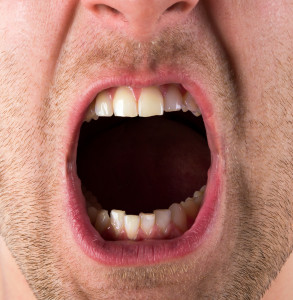 The medical term for teeth grinding (which is a condition that effects millions of Americans) is bruxism. Sheridan dentists, Dr. Cody Coon, Dr. Justin Coon, and Dr. Donald Coon diagnose bruxism by checking your teeth, bite, and jaw position for signs of chronic grinding at each dental six month dental checkup. If you have questions about bruxism, we have answers.
The medical term for teeth grinding (which is a condition that effects millions of Americans) is bruxism. Sheridan dentists, Dr. Cody Coon, Dr. Justin Coon, and Dr. Donald Coon diagnose bruxism by checking your teeth, bite, and jaw position for signs of chronic grinding at each dental six month dental checkup. If you have questions about bruxism, we have answers.
Can I Prevent Bruxism while I Sleep?
Although we can help you protect yourself from the effects of teeth grinding, bruxism is considered to be an “above the nose” issue. This means that there is usually something in your brain which tells you to grind your teeth. Stress is one of the most common causes connected to bruxism. Other causes include misalignment of the teeth and/or jaw, genetics, dental injury, and TMJ (temporomandibular joint disorder).
What if I Already have Bruxism Damage?
Although restorative dentistry has come a long way in recent years, the damage done to teeth as a result of bruxism is often serious. A dental crown can be placed on a damaged tooth to protect it from further damage, but the tooth’s natural strength and structure is compromised. Because of this, the best protection for your teeth is prevention. That said, if you have extensive wear and tear from grinding teeth, restoration is very possible.
What are Common Teeth Grinding Treatments?
If we detect signs of bruxism (which usually includes broken or worn teeth, a sore jaw, ear pain, and dull headaches) Dr. Coon or another member of our dental team might suggest behavioral or appliance treatment.
Behavioral treatment usually includes alcohol and/or tobacco cessation, diet changes, stress reduction, and an increased awareness of when you are chewing on things which should not be in your mouth (pens, fingernails, etc.). If you grind your teeth throughout the day, taking on a stress-relieving activity is often helpful. You can also use hot and cold compresses to help relax your jaw muscles before you slumber. If, however, behavioral therapy does not help you stop grinding your teeth, we will suggest appliance therapy. This involves the use of a custom-made nightguard to hold your jaw in place while you sleep.
Visit your Sheridan Dentist
For more information about bruxism and treatment, contact Grinnell Street Dental in Sheridan, Wyoming at (307) 672-7567.







